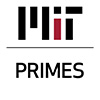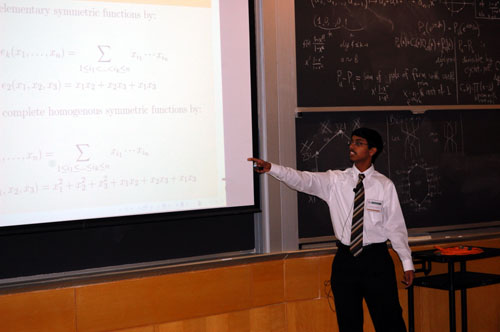 PRIMES-USA
PRIMES-USA
PRIMES-USA is a free, year-long research program in mathematics open to high school juniors and sophomores (or home schooled students of the same age) residing in the United States outside the Greater Boston area. Juniors work on individual or group projects; sophomores work on group projects. Projects are mentored by graduate students and faculty from MIT and other universities via teleconferencing, using software and hardware tools for online collaboration, or by local mentors chosen by PRIMES.

In 2013, PRIMES-USA opened with just five students. By 2024, the section has grown to 47 students. Over the years, PRIMES-USA has developed partnerships with faculty from Cornell, Stanford, Penn State, University of Illinois at Chicago and at Urbana-Champaign, City College of New York, SUNY at Stony Brook, UMass Amherst, University of Michigan, University of Washington, and many other institutions.
Timetable
The program operates throughout the calendar year in four distinct phases:
-
Phase I, January 1 – Pi Day:
Advanced reading period. By early January students are notified of the admission decision and assigned a mentor, who will recommend advanced readings that may be useful for a future research project. To successfully complete Phase I, a student must submit a brief 5-page reading report approved by the mentor by early March. PRIMES will then evaluate the student's readiness for research and invite the ones with strongest motivation, commitment and progress to proceed to Phase II.
Time commitment : at least 10 hours per week, including home study and a 1.5-hour weekly meeting with the mentor. The day/time of the meeting will be chosen to suit both the student and the mentor.
-
Phase II, Pi+0.01 Day – May 31:
Active research period. Students work on their projects under the guidance of their mentors and may occasionally discuss their projects with the MIT faculty member who suggested the project and with the head mentor. At the end of May, students submit an interim report on the progress of their research projects.
Time commitment : at least 10 hours per week.
-
Phase III, June 1 – August 31:
Independent study period. Students continue working on their projects independently, staying in e-mail contact with their mentors. PRIMES does not conflict with any summer programs , since it has a flexible schedule in the summer.
Time commitment : flexible.
-
Phase IV, September 1 – December 31:
Write-up period. Students meet with their mentors as needed and stay in regular e-mail contact. With the help of the mentor, students finalize their projects and present them at the Fall-Term PRIMES conference in mid-October, which family members and friends will be welcome to attend. By the end of the year, students also write a final paper summarizing their results, which will be posted on the PRIMES website. This paper may be submitted to national science competitions for high school students and/or sent to professional research journals for publication.
Time commitment : as needed to complete program requirements.
Milestones
- March 14: brief reading report
- June 15: interim research report
- Mid-October: conference presentation
- December 1: penultimate draft of the final paper
- January 15: final research paper
Computer requirements
Applicants must have access to a personal computer with administrator privileges, a webcam, and high-speed Internet access.
Admissions
PRIMES-USA is a free program. The students are selected on the basis of their demonstrated extraordinary mathematical ability, potential for conducting original research, and self-motivation for independent study. A small number of candidates is admitted, and a very advanced background is expected.
PRIMES-USA accepts applications for mathematical research only. It does not accept applications for research in computer science or computational biology.
For details, see How to Apply to PRIMES-USA page.
Students from underrepresented groups and with disadvantaged backgrounds are encouraged to apply .
Academic Integrity Rules
PRIMES expects its participants to adhere to MIT rules and standards for honesty and integrity in academic studies. As a result, any cases of plagiarism, unauthorized collaboration, cheating, or facilitating academic dishonesty during the application process or during the work at PRIMES may result in immediate disqualification from the program, in the sole discretion of PRIMES. In addition, PRIMES reserves the right to notify a participant's parents, schools, and/or recommenders in the event it determines that a participant did not adhere to these expectations. For explanation of these expectations, see What is Academic Integrity?
Contact
With questions, contact PRIMES Program Director Slava Gerovitch at
